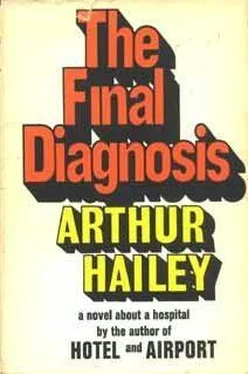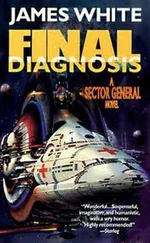Arthur Hailey - The Final Diagnosis
Здесь есть возможность читать онлайн «Arthur Hailey - The Final Diagnosis» весь текст электронной книги совершенно бесплатно (целиком полную версию без сокращений). В некоторых случаях можно слушать аудио, скачать через торрент в формате fb2 и присутствует краткое содержание. Жанр: Триллер, на английском языке. Описание произведения, (предисловие) а так же отзывы посетителей доступны на портале библиотеки ЛибКат.
- Название:The Final Diagnosis
- Автор:
- Жанр:
- Год:неизвестен
- ISBN:нет данных
- Рейтинг книги:4 / 5. Голосов: 1
-
Избранное:Добавить в избранное
- Отзывы:
-
Ваша оценка:
- 80
- 1
- 2
- 3
- 4
- 5
The Final Diagnosis: краткое содержание, описание и аннотация
Предлагаем к чтению аннотацию, описание, краткое содержание или предисловие (зависит от того, что написал сам автор книги «The Final Diagnosis»). Если вы не нашли необходимую информацию о книге — напишите в комментариях, мы постараемся отыскать её.
The Final Diagnosis — читать онлайн бесплатно полную книгу (весь текст) целиком
Ниже представлен текст книги, разбитый по страницам. Система сохранения места последней прочитанной страницы, позволяет с удобством читать онлайн бесплатно книгу «The Final Diagnosis», без необходимости каждый раз заново искать на чём Вы остановились. Поставьте закладку, и сможете в любой момент перейти на страницу, на которой закончили чтение.
Интервал:
Закладка:
“Heard what?” It was Lewis Toynbee, the internist, also with a tray, behind him. Then as Bell, beaming, passed a cigar to Bartlett, Toynbee exclaimed, “My God! Not again?”
“Certainly again. Why not?” The radiologist held out another cigar. “Join us, Lewis. It’s exactly eight Bells.”
“Eight! When was this?”
Bell said calmly, “This morning. Another boy for the ball team.”
Bill Rufus put in, “Don’t sound critical, Lewis. He’s doing his best. After all, he’s only been married eight years.”
Lewis Toynbee offered his hand. “Don’t squeeze it too tight, Ding Dong. I’m afraid some of that fertility might rub off.”
“I’m impervious to jealousy,” Bell said good-naturedly. He had been through all this before.
Lucy Grainger asked, “How is your wife?”
Bell answered, “She’s fine, thanks.”
“How does it feel to be a sex fiend?” The question was from Harvey Chandler, the chief of medicine, lower down the table.
Bell said, “I’m not a sex fiend. At our house we have intercourse once a year. I’m just a dead shot.”
Lucy Grainger joined in the ensuing laughter, then she said, “Ralph, I’m sending you a patient this afternoon. It’s one of our student nurses—Vivian Loburton.”
The laughter had simmered down. “What is it you’re looking for?” Bell asked.
“I want you to take some films of the left knee,” Lucy answered. Then she added, “There’s some sort of growth there. I don’t like the look of it.”
Back in his own office, Dr. Charles Dornberger had telephoned Kent O’Donnell to report the outcome of the talk with Pearson. At the end he had told the chief of surgery, “I’ve let Joe know about the man you people have been corresponding with.”
O’Donnell had asked, “How did he take it?”
“I wouldn’t say he was enthusiastic,” Dornberger said. “But I think if you want to have this fellow . . . what’s his name—Coleman? . . . if you want to have him come here for a talk, Joe won’t be difficult. But I’d suggest you keep Joe posted on everything you do from here on in.”
“You can be sure of that,” O’Donnell had said. Then, “Thanks, Charlie. Thank you very much.”
Afterward Dornberger had made another telephone call. It was to Mrs. John Alexander, who had phoned earlier that morning and left a message. Before calling he had looked up his record card and was reminded that this was the wife of the pathology technologist, referred to him by Joe Pearson. Talking with Mrs. Alexander, he learned that she had just arrived in town to join her husband. They made an appointment for her to come to Dornberger’s downtown office the following week.
About the same time that Mrs. Alexander was talking with Dornberger her husband was receiving his first tongue-lashing from Dr. Joseph Pearson. It happened this way.
After Pearson’s outburst that morning about the poor-quality surgical slides, Bannister had come back to the serology lab where John Alexander was working and had told him the whole story. By this time Bannister was seething, and later he had taken out some of his own bad humor on the two girl technicians and their male helper who worked in the histology lab next door. Alexander had heard what was said through the doorway which Bannister had left open behind him.
Alexander, though, knew that not all the blame for the bad slides lay with the histology technicians. Even in the short time he had been at the hospital he had sensed the real problem, and afterward he had told Bannister, “You know, Carl, I don’t believe it’s all their fault. I think they have too much to do.”
Bannister had answered sourly, “We’ve all got too much to do.” Then with clumsy sarcasm he had added, “Maybe if you know so much about it you can do your own work and part of theirs as well.”
Alexander had declined to be provoked. “I don’t think so. But I do think they’d be a lot better off with a tissue-processing machine instead of having to do everything by hand—the old-fashioned way.”
“Forget it, kid. It isn’t your problem.” Bannister had been loftily condescending. “And, besides, anything that means spending money around here is a dead duck before it starts.”
Alexander had not argued. But he resolved to raise the subject, the first chance he got, with Dr. Pearson.
He had had to go into Pearson’s office that afternoon to leave some lab reports for signature, and he had found the pathologist going through a pile of mail with obvious impatience. Glancing up at Alexander, Pearson had motioned him to put the papers on the desk and had gone on with his reading. Alexander had hesitated, and the old man had barked, “What is it? What is it?”
“Dr. Pearson, I was wondering if I could make a suggestion.”
“Now?”
A more experienced hand would have known the tone of voice meant: Leave me alone. Alexander answered, “Yes, sir.”
Resignedly Pearson said, “Well?”
A little nervously Alexander began, “It’s about speeding up the surgical reports, Doctor.” As he mentioned surgical reports, Pearson had put down his letter and looked up sharply. Alexander went on, “I was wondering if you’d ever thought of getting a tissue-processing machine.”
“What do you know about tissue processors?” There was an ominous note in Pearson’s voice. “And anyway, I thought we put you to work in Serology.”
Alexander reminded him, “I did a full course in histology at technologists’ school, Doctor.” There was a pause. Pearson said nothing, so Alexander went on. “I’ve used a tissue processor and it’s a good machine, sir. It would save us at least a day in preparing slides. Instead of processing tissue by hand through all the solutions, you set the machine overnight and automatically by morning—”
Abruptly Pearson cut in. “I know how it works. I’ve seen them.”
Alexander said, “I see, sir. Then don’t you think—”
“I said I’ve seen these so-called tissue processors and I’m not impressed.” Pearson’s Voice was harsh and grating. “There’s not the quality in the slides that there is with the old hand method. What’s more, the machines are expensive. You see these?” He riffled through a stack of typed yellow forms in a tray on his desk.
“Yes, sir.”
“They’re purchase requisitions. For things I need in this department. And every time I put a bunch through I have a fight with the administrator. He says we’re spending too much money.”
Alexander had made his first mistake in broaching the suggestion when Pearson had not wanted to hear. Now he made a second error. He mistook Pearson’s statement as an invitation to continue the discussion.
He said placatingly, “But surely, if it would save a whole day, maybe two . . .” He became more earnest. “Dr. Pearson, I’ve seen slides made with a processor and they’re good. Perhaps the one you saw wasn’t being used properly.”
Now the older man had risen from his chair. Whatever the provocation, Alexander had overstepped the bounds between physician and technologist. Head forward, Pearson shouted, “That’ll do! I said I’m not interested in a tissue processor, and that’s what I meant, and I don’t want any argument about it.” He came around the desk until he was directly in front of Alexander, his face close to the younger man’s. “And there’s something else I want you to remember: I’m the pathologist here and I’m running this department. I don’t mind suggestions if they’re reasonable. But don’t get stepping out of line. Understand?”
“Yes, sir. I understand.” Crestfallen and miserable, not really understanding at all, John Alexander went back to his work in the lab.
Mike Seddons had been preoccupied all day; several times he had had to check himself and make a conscious effort to pull back his mind to the work he happened to be doing. Once, during an autopsy, McNeil had been forced to warn him, “There’s a piece of your hand under that section you’re about to slice. We like people to leave here with all the fingers they came with.” Seddons had changed his grip hastily; it would not have been the first time that some inexperienced learner had lopped off a gloved finger with one of the razor-edged knives of pathology.
Читать дальшеИнтервал:
Закладка:
Похожие книги на «The Final Diagnosis»
Представляем Вашему вниманию похожие книги на «The Final Diagnosis» списком для выбора. Мы отобрали схожую по названию и смыслу литературу в надежде предоставить читателям больше вариантов отыскать новые, интересные, ещё непрочитанные произведения.
Обсуждение, отзывы о книге «The Final Diagnosis» и просто собственные мнения читателей. Оставьте ваши комментарии, напишите, что Вы думаете о произведении, его смысле или главных героях. Укажите что конкретно понравилось, а что нет, и почему Вы так считаете.












